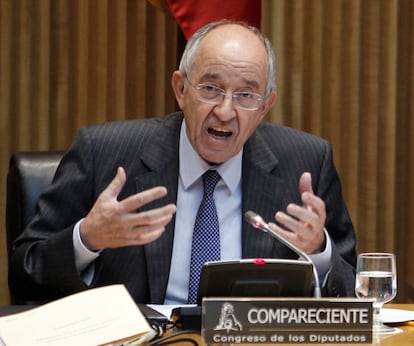Former central bank chief says it was wrong to sack Bankia chairman
State intervention damaged Spain's international image, says Fernández Ordóñez

The former governor of the Bank of Spain, Miguel Ángel Fernández Ordóñez, on Tuesday said the crisis at nationalized bank Bankia could have been resolved with the plan the central bank had drawn up, and that it would have spared Spain a large part of the current downward spiral in confidence in the country.
He said the government's decision in May to remove Bankia chairman Rodrigo Rato, a former IMF managing director and economy minister, had damaged Spain's image internationally.
Fernández Ordóñez left office a month before his mandate was due to expire after the Bank of Spain came in for criticism about its handling of the banking sector, particularly Bankia, an amalgam of seven savings banks led by Caja Madrid.
The government replaced all of Bankia's management in May. The bank subsequently restated its accounts for last year to show the biggest loss ever by a Spanish bank after having previously reported a profit. Bankia's new management then said the bank would need an additional 19 billion euros to recapitalize, a move that sparked the government's request for assistance from the EU.
"The new government introduced changes to the strategy for financial sector restructuring and decided eventually to directly manage Bankia itself," he said. "Given the fragility of the situation, I am not going to comment on what the new government has done over the past seven months. I am going to limit myself to what the Bank of Spain has done," he added.
"The Bankia case was resolved with the Bank of Spain's plan, which imposed conditions such as a non-executive chairman, but not the removal of Rato," Fernández Ordóñez told a congressional committee on the economy, which is looking into the problems in the banking sector. "I think it was a mistake that Rato left because of [Spain's] international image," Fernández Ordóñez said. "He is an important person in an international context."
Fernández Ordóñez also questioned whether Bankia needed a further 19 billion euros.
Not only are we worse off than Italy, we are also worse off than Ireland"
The former governor said the government of Prime Minister Mariano Rajoy had presided over a period in which investors had lost confidence in the country. "In the first half of this year, confidence in Spain and its financial sector has sunk, reaching levels unimaginable seven months ago," he said. "Not only are we worse off than Italy, we are worse off than Ireland itself, a country that has been bailed out," he said.
With the threat of the need for a full bailout after the European Union agreed to lend Spain up to 100 billion euros to help recapitalize its banks, Fernández Ordóñez warned that the country is now facing a very delicate situation. "Our government and the Spanish public as a whole are going to have to face very complicated situations over the coming months," he said.
The Rajoy administration was initially reluctant to allow Fernández Ordóñez to appear in Congress to answer questions on Bankia, and the former governor on Tuesday thanked the commission for allowing him to speak.
The new governor of the Bank of Spain, Luis María Linde, said the central bank under the stewardship of Fernández Ordóñez and his predecessor had failed to put a damper on lending to the real estate sector, which helped create a property bubble that burst, precipitating the crisis. He was also critical of the strategy used for forcing savings banks to merge.
"A lot of things were done badly, and above all a lot of things were not done that we now see clearly should have been done," Fernández Ordóñez acknowledged, while also defending the work of the central bank. "The Bank of Spain fulfilled its duty as a supervisor in an exceptional period in which Spain simultaneously suffered three crises: national, European and international," he said. "In light of the noise created by the handling of the Bankia case, a campaign without foundation has been launched against the Bank of Spain that has sought to totally undermine the institution."
The former governor also acknowledged that the process of merging the savings banks had been too slow, but attributed this to an "inadequate toolbox" and political interference at the regional level.
Fernández Ordóñez called for unity in dealing with the crisis. "This crisis won't resolve itself by pushing everyone into partisan confrontation," he said. "Because these are problems that are too serious, that have built up for so long and that are affecting many people, it is counterproductive to seek scapegoats on whom to lay all the blame, because there aren't any," he said.
Tu suscripción se está usando en otro dispositivo
¿Quieres añadir otro usuario a tu suscripción?
Si continúas leyendo en este dispositivo, no se podrá leer en el otro.
FlechaTu suscripción se está usando en otro dispositivo y solo puedes acceder a EL PAÍS desde un dispositivo a la vez.
Si quieres compartir tu cuenta, cambia tu suscripción a la modalidad Premium, así podrás añadir otro usuario. Cada uno accederá con su propia cuenta de email, lo que os permitirá personalizar vuestra experiencia en EL PAÍS.
¿Tienes una suscripción de empresa? Accede aquí para contratar más cuentas.
En el caso de no saber quién está usando tu cuenta, te recomendamos cambiar tu contraseña aquí.
Si decides continuar compartiendo tu cuenta, este mensaje se mostrará en tu dispositivo y en el de la otra persona que está usando tu cuenta de forma indefinida, afectando a tu experiencia de lectura. Puedes consultar aquí los términos y condiciones de la suscripción digital.








































